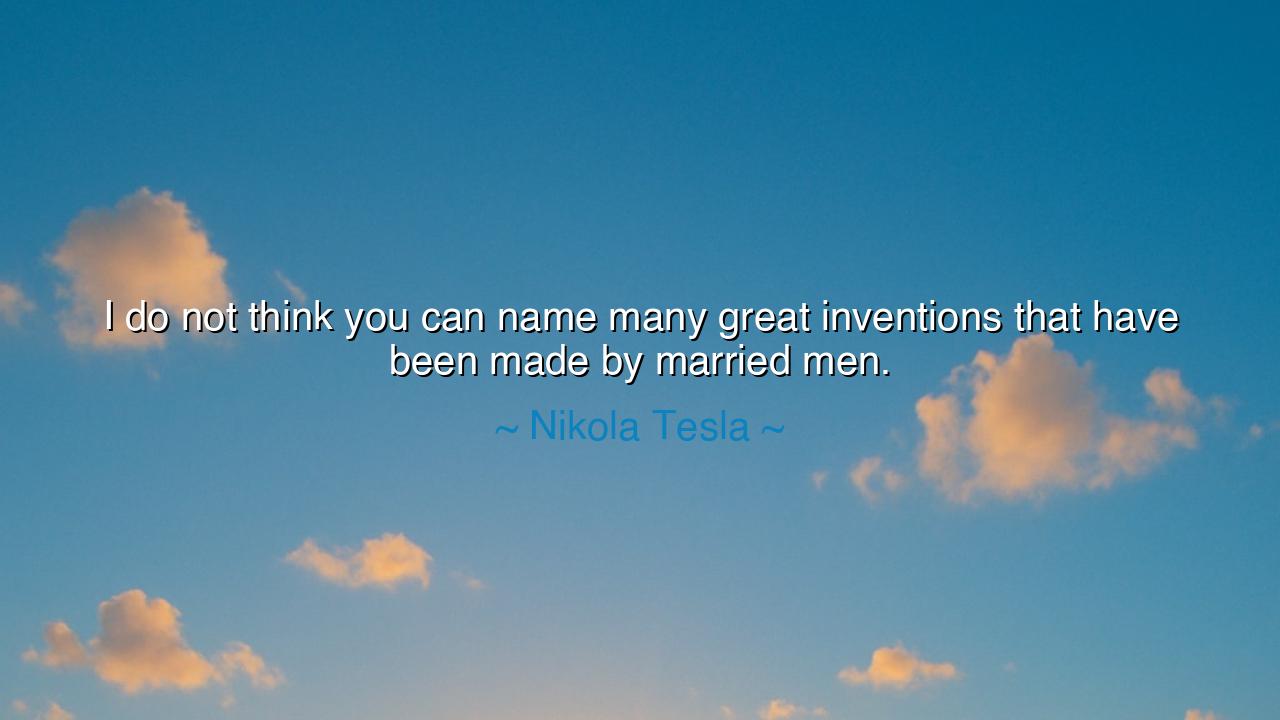
I do not think you can name many great inventions that have been






In the words of Nikola Tesla, “I do not think you can name many great inventions that have been made by married men.” At first, these words may seem harsh or dismissive of the bond between man and woman, yet beneath their austere surface lies a profound meditation on sacrifice, focus, and the nature of creation. Tesla, the solitary genius who gave the world alternating current, the radio, and the very foundations of modern electricity, understood the deep price of greatness. His words do not scorn love, but rather reveal the cost of giving oneself entirely to one pursuit — that to devote oneself wholly to the service of humanity often demands the surrender of personal happiness.
The origin of this quote is found in Tesla’s reflections on his own life and choices. He was a man consumed by invention, whose nights were as bright as his laboratories, whose mind never slept. While others sought companionship or leisure, Tesla wandered through the electric storms of his imagination, chasing the secrets of energy, motion, and light. He had once spoken tenderly of love, yet he believed that marriage divided the will — that the inventor must remain untouched by the world’s distractions if he is to serve the higher calling of discovery. In this, he echoed the ancient monks and philosophers who renounced comfort to seek truth. His celibacy was not born of disdain, but of devotion.
When Tesla spoke of the “great inventions” of unmarried men, he was not diminishing marriage, but emphasizing the power of singular purpose. The creative mind, he believed, is like a lightning bolt — brilliant, unpredictable, and dangerous when grounded. To marry, in his view, was to root oneself in the ordinary, to bind the boundless spirit to domestic life. He saw in love both beauty and peril: beauty in its warmth, peril in its power to draw the heart away from the heavens. For the inventor, whose vision must pierce the veil of reality, this was too great a distraction. And so Tesla chose solitude, walking the world as a man married not to another, but to inspiration itself.
History has known many such figures. Isaac Newton, the father of modern physics, died alone, having never married, his mind forever orbiting the mysteries of the universe. Leonardo da Vinci, painter, scientist, and dreamer, lived a life of restless curiosity, bound only to his art. Beethoven, though he loved deeply, never wed; his devotion to music consumed his heart entire. Such lives, like Tesla’s, shine fiercely — yet briefly — their light unsoftened by domestic peace. The ancients would have called them ascetics of the intellect, seekers who gave up the comfort of love to dwell among the gods of creation.
Yet Tesla’s reflection carries not only admiration, but also melancholy. In his later years, he was haunted by loneliness, walking the streets of New York with only pigeons for company. Though his inventions transformed the world, his own world grew quiet and small. The same intensity that fueled his genius left no space for companionship. Thus, his words are both a declaration and a lament — a recognition that to gain one kind of greatness often means to lose another. In this sense, his quote is not advice, but confession — the voice of a man who gave everything to his dream and wondered, in the silence of his old age, what might have been had he chosen differently.
The lesson in Tesla’s words is not that love and invention are enemies, but that every life must choose its balance. The path of creation demands focus, yet life without love risks becoming hollow. The married man may not forge as many inventions, but he builds another kind of creation — the family, the bond, the legacy of hearts intertwined. The unmarried inventor, like Tesla, builds wonders of steel and light, but often walks in darkness. The wise, therefore, must discern their calling: to know whether their gift demands solitude or whether their strength grows best in companionship.
So, my children of the future, hear this teaching: every great work demands a price. Whether that price is comfort, love, or rest, you must decide what you are willing to give for the vision that calls you. Do not despise the solitary, for they carry the world’s inventions; nor pity the devoted spouse, for they carry the world’s compassion. Tesla’s words remind us that genius and love are both sacred fires — one burns outward, the other inward. Few can hold both without being consumed. Choose with reverence, live with purpose, and remember that whether through invention or love, the highest calling of man is to create — and to leave behind something greater than himself.






AAdministratorAdministrator
Welcome, honored guests. Please leave a comment, we will respond soon